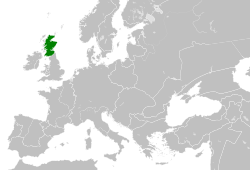
Back Шотландиа Аҳра AB Koninkryk van Skotland AF مملكة إسكتلندا Arabic مملكة اسكوتلاندا ARZ Reinu d'Escocia AST Şotlandiya krallığı AZ Шатландскае каралеўства BE Кралство Шотландия Bulgarian Rouantelezh Bro-Skos BR Regne d'Escòcia Catalan
Kingdom of Scotland | |||||||||
|---|---|---|---|---|---|---|---|---|---|
| 843–1707 | |||||||||
| Motto: Nemo me impune lacessit (Latin) ("No one provokes me with impunity") "Cha togar m'fhearg gun dioladh" (Scottish Gaelic) "Wha daur meddle wi me?" (Scots) | |||||||||
 Kingdom of Scotland in 1190 | |||||||||
| Capital | Edinburgh¹ | ||||||||
| Common languages | Scottish Gaelic, Scots | ||||||||
| Government | Monarchy | ||||||||
| Monarch | |||||||||
• 843–858 | Kenneth I | ||||||||
• 1567–1625 | James VI | ||||||||
• 1702–1707 | Anne | ||||||||
| Legislature | Parliament of Scotland | ||||||||
| History | |||||||||
• United | 843 | ||||||||
• Lothian and Strathclyde incorporated | 1124 (confirmed Treaty of York, 1237) | ||||||||
• Galloway incorporated | 1234/5 | ||||||||
| 1266 (Treaty of Perth) | |||||||||
| 1472 | |||||||||
| 1 May 1707 | |||||||||
| Currency | Pound Scots (Pund) | ||||||||
| ISO 3166 code | GB-SCT | ||||||||
| |||||||||
¹ By the early modern era established at Edinburgh, and before that Scone & various. | |||||||||
The Kingdom of Scotland was a historic country and state. It started in the Early Middle Ages and was in existence until the early modern period.
After 1603, it had the same monarch as the Kingdom of England and the Kingdom of Ireland. In 1653, during the Wars of the Three Kingdoms, the government of Oliver Cromwell made Scotland into part of the Commonwealth of England, Scotland, and Ireland: a republic. However, at The Restoration, Scotland started again to be a kingdom. It combined with the Kingdom of England to become the United Kingdom of Great Britain in 1707 because of the Acts of Union 1707.[1]
- ↑ Murdoch, Alexander. "England, Scotland, and the Acts of Union (1707)". Oxford Dictionary of National Biography (online ed.). Oxford University Press. doi:10.1093/ref:odnb/96282. ISBN 978-0-19-861412-8. Retrieved 2021-06-17. (Subscription or UK public library membership required.)


